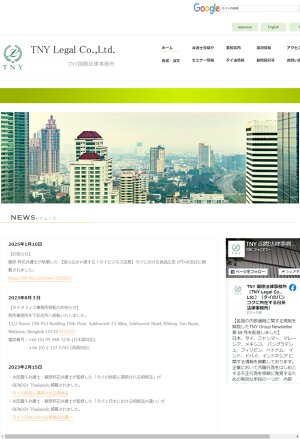Best Intellectual Property Lawyers in Bangkok
Share your needs with us, get contacted by law firms.
Free. Takes 2 min.
List of the best lawyers in Bangkok, Thailand
Legal guides written by Smart Legal Solutions:
- Main Legal Measures to Protect Foreign Investment in Thailand
- The importance of the geographical indications for the Thai economy
Legal guides written by Mahanakorn Partners Group Co., Ltd:
- Thailand Strengthens Anti-Money Laundering Laws with New Amendments
- Recent Updates to Thailand’s Long-Term Resident (LTR) Visa and SMART Visa Programs
- Managing Risks in Public-Private Partnership Projects
Thailand Intellectual Property Legal Articles
Browse our 3 legal articles about Intellectual Property in Thailand written by expert lawyers.
- Understanding Trademark Laws in Thailand
- Despite several coups, Thailand's economy has remained strong and vibrant and has long attracted both local and international businesses from all around the world. As companies expand and enter fresh markets, the value of intellectual property (IP) becomes even more evident. Since it maintains a company's brand identity and safeguards... Read more →
- IP Protection in Thailand: A Comprehensive Guide for Businesses
- As Thailand grows into an important business place in Southeast Asia, companies must protect their ideas and new innovations. Thailand has laws and agrees to follow international rules that help you keep your valuable ideas and innovations safe. In this guide, we will learn about protecting your creations, innovations, and... Read more →
- The importance of the geographical indications for the Thai economy
- According with the Thai Geographical Indications Protection Act, a Geographical Indication means a name, symbol or any other thing which is used for calling or representing a geographical origin and can identify the goods originating from such geographical origin where the quality, reputation or other characteristic of the goods is... Read more →
About Intellectual Property Law in Bangkok, Thailand
Intellectual Property (IP) law in Bangkok, Thailand, plays a crucial role in promoting innovation, creativity, and economic growth. As the country's capital and a hub for innovation and business, Bangkok hosts a rich landscape of IP activities. IP in Thailand includes patents, trademarks, copyrights, and trade secrets, which are essential for protecting the intangible assets of businesses and individuals. The Department of Intellectual Property, under the Ministry of Commerce, is the primary government body responsible for IP management and enforcement in Thailand.
Why You May Need a Lawyer
Navigating the complexities of IP law in Bangkok can be challenging. You may need a lawyer if you are:
- Registering a trademark, patent, or copyright in Thailand, as the process can be intricate and require meticulous documentation.
- Dealing with IP infringement issues, such as unauthorized use of your trademark or copyright.
- Negotiating licensing agreements that involve your IP assets.
- Involved in IP disputes or litigation, requiring expert legal representation.
- Seeking to expand your business internationally and need advice on protecting your IP rights abroad.
Local Laws Overview
Thai IP laws are designed to align with international standards, with various laws governing different aspects of IP:
- Trademark Act: Protects distinctive symbols, logos, or names associated with goods or services.
- Patent Act: Covers inventions, including processes, machines, and compositions of matter.
- Copyright Act: Protects literary, artistic, and other creative works.
- Trade Secret Act: Safeguards confidential business information from unauthorized use.
These laws are enforced by the Department of Intellectual Property, with measures in place to handle IP disputes and violations.
Frequently Asked Questions
What is the process for registering a trademark in Thailand?
Trademark registration involves filing an application with the Department of Intellectual Property, undergoing an examination process, and waiting for publication in the Trademark Gazette for any opposition before being granted.
How long does patent protection last in Thailand?
Patent protection in Thailand lasts for 20 years from the filing date for inventions, and 10 years for design patents.
What are considered copyrightable works in Thailand?
Copyrightable works include literary, dramatic, musical, and artistic works, as well as films and sound recordings.
Can foreign companies register IP in Thailand?
Yes, foreign entities can register IP in Thailand. However, it is often advisable to work with a local attorney to navigate the regulatory requirements.
What actions can be taken in case of IP infringement in Thailand?
You can file a complaint with the Department of Intellectual Property or seek legal action through the courts, including civil and criminal remedies.
Is it necessary to have a physical address in Thailand to register a trademark?
No, but having a local representative or agent is recommended to manage communications and submissions.
What are the penalties for IP infringement in Thailand?
Penalties can include fines, imprisonment, or both, depending on the severity and nature of the infringement.
Can IP be licensed in Thailand?
Yes, IP owners can license their rights to others. Licenses should be well-documented and legally binding.
How are IP disputes resolved in Thailand?
IP disputes can be resolved through mediation, arbitration, or litigation in Thai courts, with specialized IP and International Trade Courts handling complex matters.
What is the "fair use" doctrine in Thailand's Copyright Act?
The "fair use" doctrine permits limited use of copyrighted work without permission for purposes such as education, research, criticism, and news reporting, provided it does not infringe on the creator’s rights.
Additional Resources
For more information and assistance, consider reaching out to:
- Department of Intellectual Property (DIP): The main government body for IP matters.
- Thailand Board of Investment (BOI): Provides support for foreign businesses in Thailand, including IP advice.
- Local law firms: Many reputable law firms in Bangkok specialize in IP law.
- World Intellectual Property Organization (WIPO): Offers guidance on international IP protection.
Next Steps
If you need legal assistance in Intellectual Property law in Bangkok, consider the following steps:
- Assess your IP needs: Determine whether you need to register an asset, defend against infringement, or handle a dispute.
- Research and list a few specialized IP law firms or attorneys in Bangkok with positive reviews or recommendations.
- Schedule consultations to discuss your IP issues and explore how they can assist you.
- Choose a lawyer or firm that understands your needs and provides a clear roadmap for addressing your IP concerns.
Lawzana helps you find the best lawyers and law firms in Bangkok through a curated and pre-screened list of qualified legal professionals. Our platform offers rankings and detailed profiles of attorneys and law firms, allowing you to compare based on practice areas, including Intellectual Property, experience, and client feedback.
Each profile includes a description of the firm's areas of practice, client reviews, team members and partners, year of establishment, spoken languages, office locations, contact information, social media presence, and any published articles or resources. Most firms on our platform speak English and are experienced in both local and international legal matters.
Get a quote from top-rated law firms in Bangkok, Thailand — quickly, securely, and without unnecessary hassle.
Disclaimer:
The information provided on this page is for general informational purposes only and does not constitute legal advice. While we strive to ensure the accuracy and relevance of the content, legal information may change over time, and interpretations of the law can vary. You should always consult with a qualified legal professional for advice specific to your situation.
We disclaim all liability for actions taken or not taken based on the content of this page. If you believe any information is incorrect or outdated, please contact us, and we will review and update it where appropriate.
Browse intellectual property law firms by service in Bangkok, Thailand
Bangkok, Thailand Attorneys in related practice areas.

















